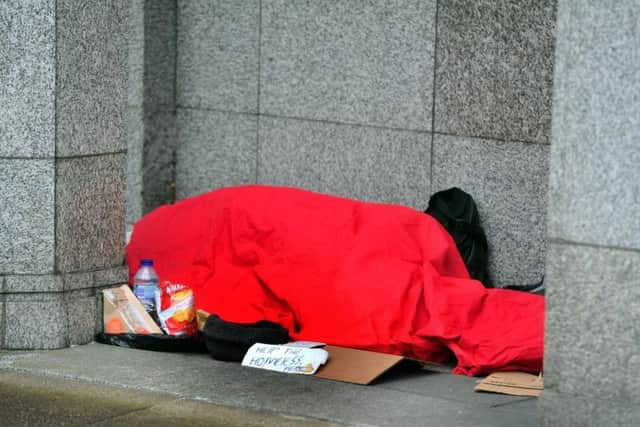Illness, suicide and murder - why homeless and rough sleepers in Leeds and UK are dying
and live on Freeview channel 276
The Bureau of Investigative Journalism today released the final count in its Dying Homeless project, which reveals that 796 people are known to have died homeless in the last 18 months across the UK - equating to almost 11 people a week.
Eleven of the 22 such estimated deaths in Yorkshire and the Humber tracked over 18 months occurred in Leeds, with the latest just last week.
Advertisement
Hide AdAdvertisement
Hide AdNew research, undertaken by University College London (UCL) and seen exclusively by the Bureau, also found homeless people are much more likely to die of treatable conditions than even the most economically-deprived housed population.


Almost a third of the deaths UCL explored were from treatable illnesses such as tuberculosis, pneumonia or gastric ulcers, which could have improved with the right medical care.
Suicide and murder accounted for many other deaths beyond that proportion.
Matt Downie, director of policy and external affairs at the charity Crisis, said: “ “To know that so many vulnerable people have died of conditions that were entirely treatable is heart-breaking. What’s worse, we’re unable to learn the lessons needed to prevent these senseless deaths from recurring. Governments must urgently expand the systems used to investigate the deaths of vulnerable adults to include all those who have died while homeless,”
Advertisement
Hide AdAdvertisement
Hide Ad“But ultimately, 800 people dying homeless is unacceptable - we have the solutions to ensure no one has to spend their last days without a safe, stable roof over their head. By tackling the root causes of homelessness, like building the number of social homes we need and making sure our welfare system is there to support people when they fall on hard times, governments in England, Scotland and Wales can build on the positive steps they’ve already taken to reduce and ultimately end homelessness.”
“As it comes to an end, it is difficult to overstate the importance of the Dying Homeless Project, which has shed new light on a subject that was ignored for too long."
The data has been collected after the Bureau, which works with news organisations such as the Yorkshire Evening Post, discovered that no single body was recording if and when people were dying while homeless – although last October the Office for National Statistics began collating such figures.
The Bureau will now pass on the project to the Museum of Homelessness.
Advertisement
Hide AdAdvertisement
Hide AdFor its study, academics at UCL explored nearly 4,000 in-depth medical records for 600 people that died while homeless in England, between 2013 and 2017.
The research found that homeless people are much more likely to suffer heart disease and strokes than equivalently economically disadvantaged, housed populations. A fifth of the deaths explored by UCL were cancer-related. Another fifth died from digestive diseases such as intestinal obstruction or pancreatitis.
Around 27 per cent of the Bureau’s total were under 40 when then they died.
When counting, the Bureau used Crisis’ definition of homelessness as including: people sleeping rough, those registered as statutory homeless by their local authority and those who are living long-term as “hidden homeless” such as “sofa-surfers”.
Advertisement
Hide AdAdvertisement
Hide AdCommunities Secretary James Brokenshire MP said: “No one is meant to spend their lives on the streets, or without a home to call their own.
"Every death on our streets is too many and it is simply unacceptable to see lives cut short this way. That’s why we are investing £1.2bn to tackle homelessness and have bold plans backed by £100m to end rough sleeping in its entirety.”
In full: the people included in the Dying Homeless count
- Jeffrey John Hepburn, 54, October 13, 2017 - Jeffrey's body was found in a tent by a passerby. An inquest heard Mr Hepburn regularly visited Mill Hill Unitarian Chapel in Leeds city centre and told people there that he had been a sergeant in the army.
- Alan Cambell, October 20, 2017 - More than 50 people gathered for a candlelit memoria to honour the "Gentle Giant". The inquest found the medical cause of death was multiple organ failure, severe sepsis, pneumonia and chronic intravenous substance abuse.
Advertisement
Hide AdAdvertisement
Hide Ad- "Geordie" - October 2017 - Geordie died the week before Alan Cambell
- Nigel Walley, 50, December 2017 Nigel, who died a few days before Christmas.
- Kenneth Howson, 65, January 5, 2018 - Kenneth’s decomposed body was found in a field where he lived in a tent.
- Fiona Watson, 56, January 8, 2018 - Fiona was found collapsed in the Dark Arches in Leeds,
Advertisement
Hide AdAdvertisement
Hide Adthe same place where Alan Cambell died less than three months earlier.
- Ryan Thomas McGurgan, 33, April 10, 2018 - Ryan was found dead in a hostel for homeless men. He was found the morning he was due to be recalled to prison.
- Jason Wager, 52, July 10 2018 - Jason, also known as JJ, was believed to have been sleeping rough in Leeds for around three decades.
- Andrew Burnett, 27, October 3, 2018 - Reportedly found in Penny Pocket Park.
Advertisement
Hide AdAdvertisement
Hide Ad- Lee Jenkinson, December 4, 2018 - Lee died in hospital with family members at his bedside. He had been sleeping rough for a long time, despite having a council flat.
- 'Tasha', March 7 2019 - A woman was found dead in Leeds city centre.